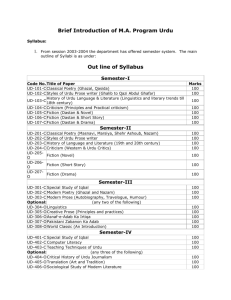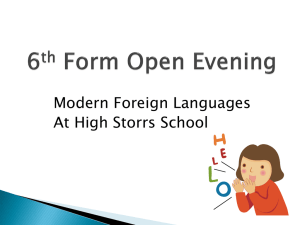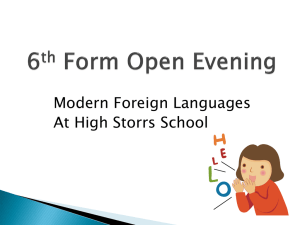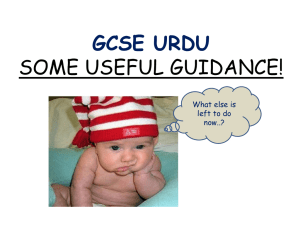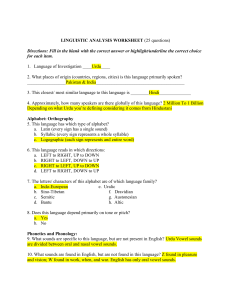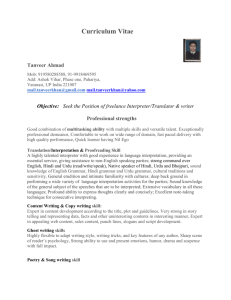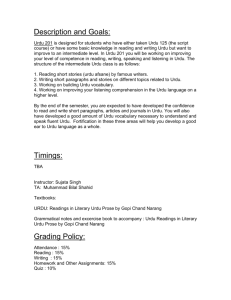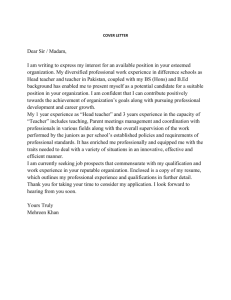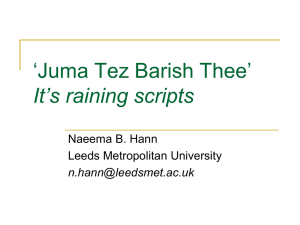Urdu 1 Graduate Language
advertisement
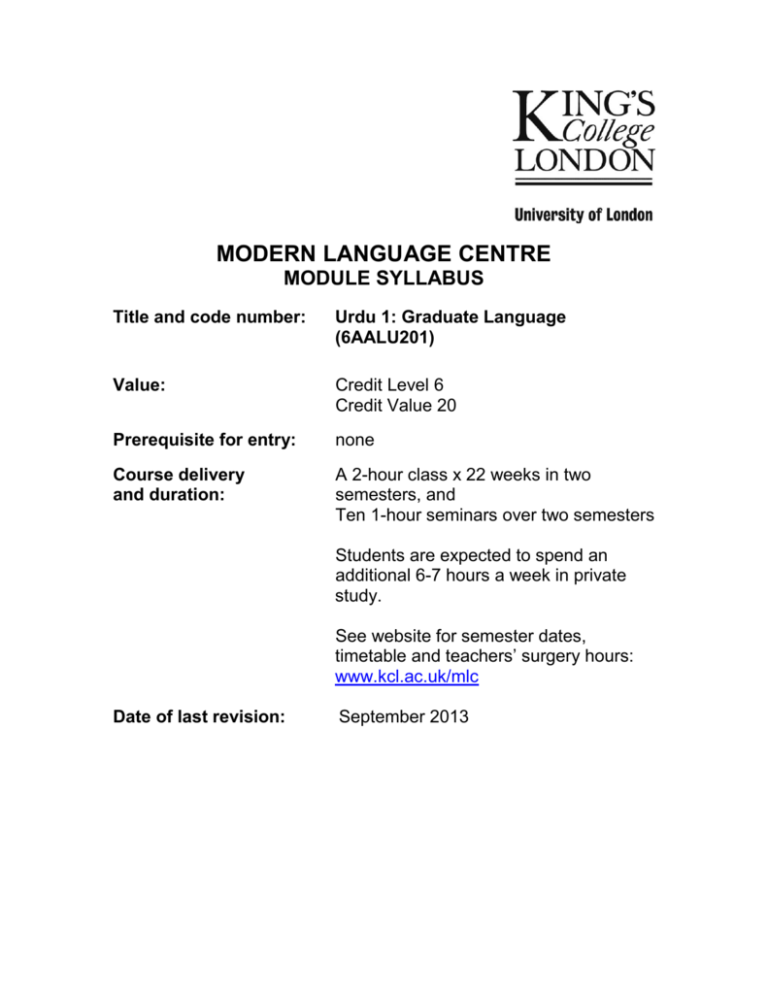
MODERN LANGUAGE CENTRE MODULE SYLLABUS Title and code number: Urdu 1: Graduate Language (6AALU201) Value: Credit Level 6 Credit Value 20 Prerequisite for entry: none Course delivery and duration: A 2-hour class x 22 weeks in two semesters, and Ten 1-hour seminars over two semesters Students are expected to spend an additional 6-7 hours a week in private study. See website for semester dates, timetable and teachers’ surgery hours: www.kcl.ac.uk/mlc Date of last revision: September 2013 (6AALUR201) EDUCATIONAL AIMS OF THE MODULE This module aims to enable the students to: develop the skills of listening, speaking, reading and writing in a range of predictable situations and contexts interact in a simple way orally and in writing with a sympathetic speaker of the language develop strategies for coping with unfamiliar language or unexpected responses, such as asking for repetition or clarification use Urdu to reinforce/further their knowledge of other disciplines acquire linguistics skills, tools and knowledge to become independent lifelong learners by using Urdu for target academic activities and personal enrichment develop an insight into the nature of language, culture and society and a greater degree of intercultural competence appreciate linguistic concepts and applied aspects of linguistics research and critically analyse linguistics-related topics using a wide range of sources and present it convincingly, using clearly structured, original text LEARNING OUTCOMES OF THE MODULE The students will be able to demonstrate intellectual, transferable and practical skills appropriate to a level 6 module and in particular will demonstrate the ability to: have a basic factual knowledge base and range of vocabulary understand and use familiar everyday expressions and high-frequency vocabulary in predictable situations. produce short, simple texts, e.g. writing a postcard. have basic intercultural awareness, to enable them to understand simple references to the most common aspects of the culture, everyday life and current issues in the country/countries where Urdu is spoken. be able to read, assess and analyse short, simple texts, and engage in evaluative thinking using given criteria objectively compare some aspects of their culture to that which is being studied using the tools of intercultural learning interact creatively and flexibly with others as part of a team research a linguistic topic, evaluating and extracting information for relevancy and validity from a range of complex written and spoken sources engage in evaluative, analytical thinking and complex problem solving etc. using their own knowledge and skills work autonomously, with minimal direction from the teacher 2 (6AALUR201) CLASS DELIVERY AND TEACHING METHODS Although every class is designed taking into consideration the above objectives, the structure of particular sessions may vary. The general approach to all Modern Language Centre classes is communicative - the language is dealt with in social situations and students are encouraged to participate as much as possible. Urdu will be used for communication in class and students will be asked to participate in classroom activities and to contribute to short role-plays, games and other language-centred activities. Seminars will be in English. LANGUAGE TOPICS – LEXICAL CONTENT Personal and social life (family, friends, daily routine) Nationalities and countries Travel, transport and directions Work and professional life Languages Numbers Calendar, time, dates Daily routine Leisure time and hobbies Accommodation Health and the body Shopping Holidays Eating and drinking, restaurants Colours, measures, forms Physical and psychological descriptions of people LANGUAGE FUNCTIONS - PRAGMATICS Greetings and introductions, spelling names Formal and informal functions Saying and understanding numbers Asking about nationality Asking and giving personal information Being able to talk about everyday life Being able to express agreement/disagreement Asking and giving directions Asking and giving the time/date Making, accepting and refusing offers Making and accepting apologies 3 (6AALUR201) Being able to arrange meetings and appointments Speaking and giving information on the phone Describing people and places Going shopping Ordering in a bar/restaurant Booking a hotel room Talking about daily routine/free time Talking about events in the past GRAMMAR AND USE OF LANGUAGE Gender and number of nouns and adjectives Verbs “to be” and “to have” Definite and indefinite articles Negatives Subject pronouns Present tense of regular and some irregular verbs Present tense of reflexive verbs Prepositions of time and place Interrogative, demonstrative and indefinite pronouns Direct object pronouns Possessive adjectives and pronouns Adverbs of time and frequency Demonstrative adjectives Irregular Verbs in the present tense Comparative and superlative Topics for the seminar series will be distributed separately. COURSE BOOK(S) Let’s study Urdu: An Introduction to the Script by Ali. S. Asani, Syed Akbar Hyder Various materials taken from other sources (i.e. other course books, newspapers, authentic handouts) will be supplied by the teacher during the course. RECOMMENDED MATERIAL FOR SELF-STUDY Urdu: An Essential Grammar by Ruth Laila Schmidt. Colloquial Urdu by Tej K. Bhatia and Ashok Koul Advanced Urdu by Zarina Khand Learn Urdu the Easy Way: Step by step Urdu by Pervez Akhtar. Learn Urdu in 30 days by NSR Ganath _1981. 4 (6AALUR201) Learn Urdu for English Speakers Published by Saphrograph Corp, 1983. Learn Urdu in a Month: Easy Method of learning Urdu Through English without a Teacher by A R Zakaria. Urdu Self-taught; a most useful guide for those who desire to learn Urdu, through the medium of English. By S. M. Yunus. Urdu, Conversational: Learn to Speak and Understand Urdu with Pimsleur Language Programmes by Paul Pimsleur. Urdu: Urdu grammar and reader by Ernest Bender. Spoken Urdu: A beginning course by Eugene .H. Glassman. Complete Urdu with Two Audio CDs: A Teach Yourself Guide (TY: Language Guides) OPEN LEARNING CENTRE Research shows that successful language learners regularly review their progress, have regular and steady exposure to the language and, at higher levels, work on problematic structures – hence our asking you to work for 4-6 hours a week outside class time. In order to support you with your independent learning and be in contact with the culture of the language(s) you are learning, you are encouraged to use the resources in the Open Learning Centre – OLC (K1.072, first basement) which provides a friendly learning environment with state of the art facilities. The Centre's multilingual learning advisors are always on hand to advise you on how to make the most efficient use of the open learning facilities as well as on how to become a more effective language learner. The Centre's resources include 32 satellite TV channels from around the world; foreign language films and first class learning materials on DVD and via streamed digital media; inhouse learning materials available on KEATS and Wimba Voice tools; multilingual language learning software; daily and weekly newspapers and magazines; dictionaries, reference books and textbooks. During the first few weeks of the course, your teacher will arrange an induction session for the class in the OLC so that you can familiarize yourself with the facilities. During Term one and Term two the OLC will also facilitate free workshops on how to get the most of your language classes. For a list of topics as well as dates and times, including the opening hours of the OLC, please go to their website: http://www.kcl.ac.uk/schools/humanities/depts/mlc/olc/ ATTENDANCE Attendance is compulsory for all language modules (SSCs) and Linguistics Seminars. Your attendance record needs to be 75% or above (15/20 language classes & 9/12 Linguistics Seminars), or you may be withdrawn from the module on the grounds of non-attendance. If your absences are legitimate due to 5 (6AALUR201) mitigating circumstances, you will need to provide appropriate evidence demonstrating this to the MLC office - this could be a letter from your personal tutor or a medical certificate, etc. If you miss a class because you are ill or have other urgent personal problems, it is your responsibility to catch up on the contents of the class you missed. You will find the week-by-week syllabus as well as the homework assignment for your module on KEATS, and it is always a good idea to contact a fellow student about more details. ASSESSMENT For all details regarding deadlines and dates for assessment see the website http://www.kcl.ac.uk/artshums/depts/mlc/modules/dates.aspx Formative assessment Formative assessment takes place during the Reading Week in Term 2. This does not count towards your final mark, but failure to submit the work may result in you being withdrawn from the module or prevented from sitting the examinations. It is strongly recommended that you complete the formative assessment because it will provide you with feedback on your progress as the Final Exam approaches. Test (2 hours) The test will consist of four parts: Part one: Listening comprehension Part two: Reading comprehension Part three: Grammar and vocabulary in context Part four: Writing 0% (20 points) (20 points) (20 points) (40 points) Feedback All pieces of formative assessment are normally returned to students within 2 weeks, and the teacher will provide feedback in groups and/or individually. Group feedback will be provided in class where appropriate. In addition students can book themselves for individual feedback during surgery hour (see day/time on the web-page: http://www.kcl.ac.uk/schools/humanities/depts/mlc/staff/surgery.html Linguistics Essay Linguistics-related essay, in English (1500 words coursework) 30% 6 (6AALUR201) Due date: 6th May 2014 Final examinations Oral exam (15-20 min.) Exam period: 22nd April 2014 – 2nd May 2014 30% Students are examined individually and the examiner will play a part in the roleplay. The oral exam will consist of two parts: Part one: 5-10 minute role-play situation Part two: 10-15 minute free conversation on topics such as student’s family, home, city, hobbies, etc. Students will be able to download the task brief from KEATS. Written exam (2 hours) Exam period: 6th May 2014 – 30th May 2014 This exam will consist of three parts: Part one: Reading comprehension Part two: Use of Urdu Part three: Writing 40% 20-30 points 35-40 points 35-40 points No dictionaries or notes are allowed during the test or final examination. Past papers are available on KEATS. 7
